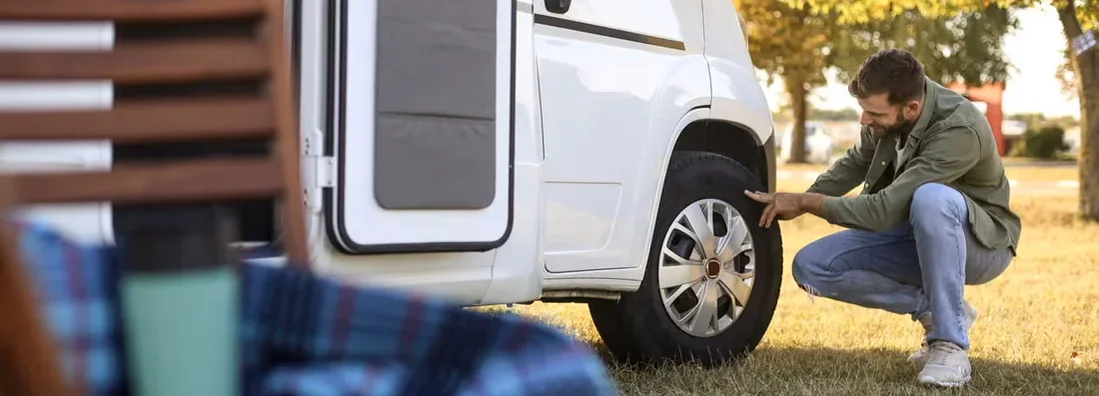RV Insurance Claims
Get step-by-step instructions for how to file RV insurance claims easily and efficiently.

You may need to file an RV insurance claim for any number of reasons, ranging from an overturn on an icy highway to theft, vandalism, storm damage, or an accident with another vehicle. Your RV insurance can cover the cost of damage or loss up to the limits of your policy. But first, you need to understand how to file a claim.
Understanding the process of filing RV insurance claims before disaster ever occurs can help save you time and energy when you need to act quickly. This can also help ensure you receive any reimbursement you're entitled to as fast as possible. If you're still in need of an RV insurance policy, a local independent insurance agent can help you get covered. But until then, here's our guide to filing RV insurance claims the right way.
How to File an RV Insurance Claim
Follow these simple step-by-step instructions to file RV insurance claims when necessary.
Step 1: Contact the police
After any kind of traffic accident, including those involving an RV, your first order of business should be to contact the local police. Authorities will survey the scene of the accident to determine who was at fault. This information will be critical to have when filing your insurance claims.
Step 2: Seek medical attention
If anyone was injured in the accident, get them medical attention immediately. You may have coverage for medical treatments for yourself and your passengers if you have medical payments insurance included in your RV insurance policy. Your RV insurance can also cover injuries to third parties after an accident you were at fault for if you have RV liability insurance.
Step 3: Document the damage
Once the police have been notified and medical attention is underway, it's time to document the damage to your RV. Make sure to cover the incident from all angles and get photo and video evidence. If you were in a collision with another driver, make sure to get their contact information, license plate number, and insurance information.
Step 4: Contact your independent insurance agent
Your next step after an accident should be to call your independent insurance agent. Your agent will ask you a few questions about the accident, such as:
- Was anyone injured?: Your agent will need this information in the event that there are medical costs involved.
- Where is your motorhome?: If you cannot move your RV, your agent may be able to arrange for it to be towed to a repair shop. Your carrier can reimburse you for this cost if you have towing and roadside assistance coverage in your RV insurance policy.
- What happened?: Give your agent the details of the accident and include important information like police reports and photos of the damage. If you were in a collision with another driver, give your agent copies of the driver’s contact and insurance information. If someone broke into your RV, include details on what was taken. Make sure to also give your agent copies of receipts for any items that were taken.
Your independent insurance agent can then initiate the claims process for you. They can call your RV insurance company directly and provide the details you've given them to get the process underway.
Step 5: Schedule an inspection and repairs
Your independent insurance agent may be able to handle these steps for you. They'll work with your insurance company to schedule a visit from an insurance adjuster to assess the damage to your RV in person if necessary. You will be provided with an estimate of what it should cost to repair your RV if it's salvagable, or your vehicle may be determined a total loss. From there, your agent can schedule an appointment for repairs to your RV at a local shop that's approved by your carrier. If your RV is declared a total loss, however, you may be eligible to receive a similar replacement vehicle of the same model year or newer from your insurance company provided your policy includes total loss replacement coverage.
Step 6: Receive your settlement
Completing the claims process may take some time. You will have been assigned a claim number as well as a claims representative. Be sure to keep your claim number handy along with the phone number for your insurance company so you can follow up with any questions.
Your independent insurance agent will keep you updated throughout every step of the claims process, including by providing you with ETAs for when you can expect your settlement payout. Once you've received your settlement payment from your insurance company, the claims process is complete. If your RV has been repaired or replaced, it's time to get back out on the road.
An Independent Insurance Agent Can Help You File RV Insurance Claims
The best approach is to be prepared long before an incident happens that may require you to file an RV insurance claim. Find an independent insurance agent today and get the coverage you need for your RV. If the time ever comes to file claims, your agent will be ready to help.
https://www.progressive.com/claims/rv-process/
https://www.transparityinsurance.com/a-guide-to-filing-an-rv-insurance-claim/
https://clovered.com/rv-insurance-claims/
